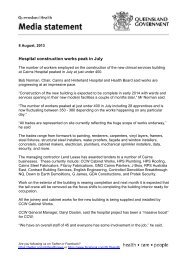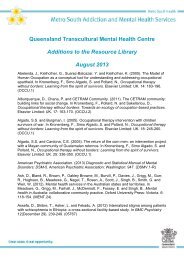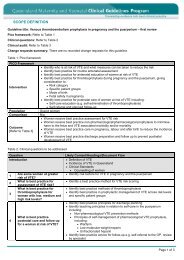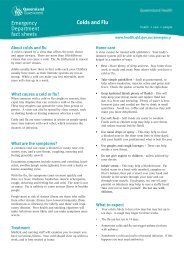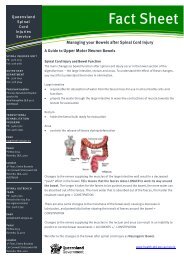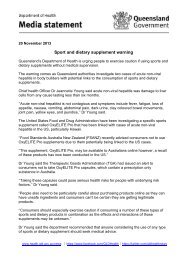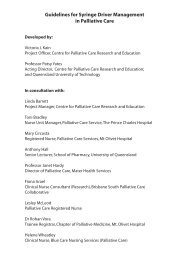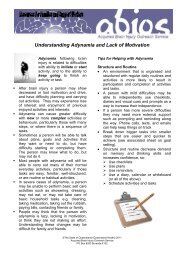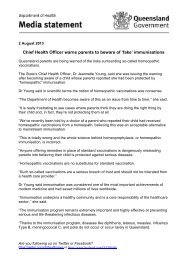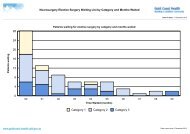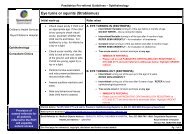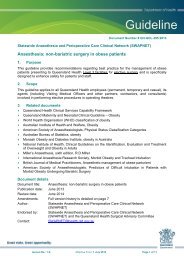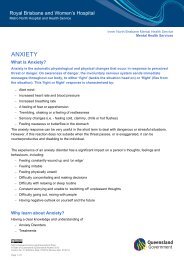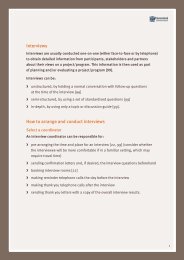Paediatrics - Queensland Health - Queensland Government
Paediatrics - Queensland Health - Queensland Government
Paediatrics - Queensland Health - Queensland Government
Create successful ePaper yourself
Turn your PDF publications into a flip-book with our unique Google optimized e-Paper software.
Gastrointestinal problems<br />
620<br />
Controlled copy V1.0<br />
Failure to thrive<br />
Recommend<br />
Refer to Poor growth in children care plan in the latest edition of the Chronic Disease<br />
Guidelines www.health.qld.gov.au/cdg<br />
MO / Dietitian to perform complete examination and calculate the degree of failure to<br />
thrive - mild, moderate or severe, using weight for age, and weight for height, for Z<br />
score<br />
Provide nutritional supplements for management of failure to thrive depending on<br />
severity<br />
It is important in an underweight child to differentiate wasting (thin child) of acute<br />
failure to thrive from stunting (short child) due to chronic failure to thrive. Often both<br />
are present, and can be assessed on anthropometric measurements of weight and<br />
height for age and sex<br />
Background<br />
Suite of Growing Strong resources available at:<br />
www.health.qld.gov.au/ph/documents/hpu/growingstrong.asp<br />
Failure to thrive (FTT) refers to child whose weight is less than normal for gestational<br />
corrected age / gender and past medical history. Children with genetic short stature,<br />
intrauterine growth retardation or prematurity, who have appropriate proportional<br />
weight for length and normal growth velocity, are not regarded as FTT<br />
Related topics<br />
Anaemia<br />
Giardia<br />
Intestinal worms<br />
Lactose intolerance<br />
Urinary tract infection - child<br />
1. May present with<br />
• Any condition<br />
• A child whose weight has crossed down 2 or more major centile lines on standard<br />
growth charts (and who is not overweight or obese) [7]<br />
2. Immediate management Not applicable<br />
3. Clinical assessment<br />
• Obtain a complete patient history including:<br />
- - family and social history - spend time assessing the social situation:<br />
○ who is the main carer? which other family members contribute to looking<br />
after the child, household and buying food?<br />
○ amount of support the carer has? extended family? friends?<br />
○ have other children in the family had problems with growth faltering?<br />
○ ask about food security, financial security?<br />
- - cultural history<br />
- - medical history - past or current illnesses<br />
- - birth history - low birth weight (preterm or IUGR)<br />
- - mother’s antenatal history - particularly alcohol and smoking intake<br />
-- nutrition intake - if breastfed, frequency of feeding during night and day, if<br />
formula fed when did the formula start? how is it prepared? other milks or<br />
drinks?<br />
- - solids, type - when were solids introduced? frequency of feeding?<br />
- - eating pattern<br />
- - urine output and number of stools per day<br />
Primary Clinical Care Manual 2011



